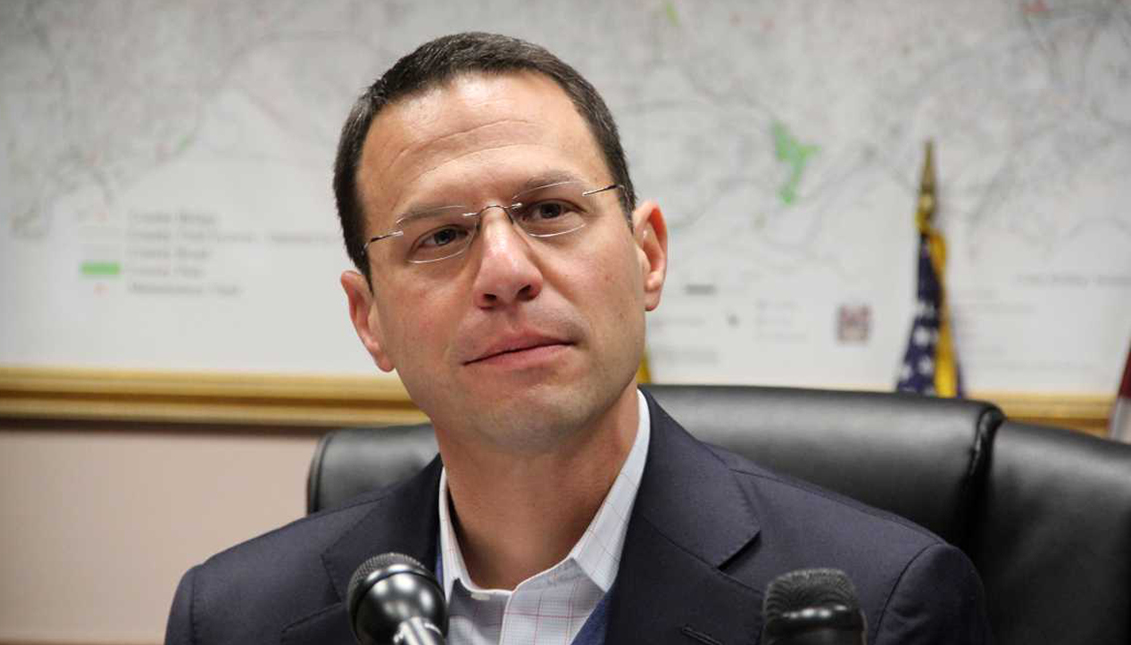
PA Attorney General Josh Shapiro discusses the 2020 election, battling Trump, and his political future
Weeks before the election Attorney General Shapiro sat with AL DÍA to talk all things 2020 heading into what will be a crazy finish to a crazy year.
Since being sworn in as Pennsylvania’s Attorney General in January 2017, Josh Shapiro has continuously battled against President Donald Trump and his agenda in the courts.
Days into his new position, he opposed the president’s travel ban, which sought to limit migration to the U.S. from several predominantly Muslim countries.
Most recently his efforts were focused on ensuring that voters from the Keystone state could safely participate in the 2020 election, whether they choose to vote-by-mail or in person.
Due to Trump’s handling of the Coronavirus pandemic, which involved downplaying the crisis for months, Americans will not have a normal election day as more people than ever before will fill out a mail-in ballot.
The electorate will also likely not know on election night who their next president will be and have to wait days if not weeks for results.
Although over 9 million people have already voted, there will be a delay because states like Pennsylvania — a crucial battleground state — have laws that prohibit them counting mail-in ballots until Election Day.
Forcing people to vote in person will only worsen the spread of the virus and it’s why a push for states to expand mail-in voting has become necessary for the nation to combat the public health crisis while preserving its democracy.
Trump has publicly made false statements about the alternative voting process, citing a belief that if it were to be scaled up, it will lead to massive voter fraud that will favor the Democratic Party.
His detest for the process is so strong that he held up a coronavirus relief package, during a time when millions of Americans are unemployed and facing eviction, because it included additional funding for the United States Postal Service (USPS) and election infrastructure.
Attorney General Shapiro has specifically tried to halt changes made at the USPS by their new Postmaster General, Louis DeJoy.
DeJoy is a Republican mega donor, contributing $1.2 million to the Trump Victory Fund, who has also had significant financial ties to companies that contracted with or competed against the USPS.
Since heading the agency, he has called for restricting extra or late trips for mail delivery, prohibiting overtime for its workers and other measures that have led to delays in service.
In mid-August, Shapiro announced that Pennsylvania would lead a multi-state coalition in a lawsuit filed in the U.S. District Court for the Eastern District of Pennsylvania to challenge the operational changes at the USPS.
“We have won that lawsuit that I filed here in Pennsylvania… As a result of us winning the Postal Service is now required to rollback the changes they made which slow down mail delivery for seniors who are waiting for the prescriptions, small businesses who are waiting for checks and of course it raised concerns about ballots and whether they would be delivered on time,” Shapiro said while assuring that people can feel safe voting by mail.
He also responded to Trump’s comments at the presidential debates where he urged his supporters to become poll watchers at voting sites.
The president referenced an incident that occurred in Philadelphia, where a woman who said she was hired by his campaign as a poll watcher was not allowed into a satellite office for the city’s Board of Elections.
The Attorney General acknowledged that Pennsylvania law permits having poll watchers on Election Day, but believes that Trump has other underlying motives beyond election security.
“Make no mistake, what he is trying to do is bring people from across the state into Black and Brown communities to try to intimidate voters,” he said.
The Trump Campaign sued the Keystone state in August to have them remove a county residency requirement for individuals to observe polls. On Oct. 10, that lawsuit was thrown out by a federal judge.
According to Census data the Commonwealth of Pennsylvania has nearly a million Hispanic or Latino residents.
President Trump has scapegoated the Latinx community and its undocumented segment in particular when campaigning across the country.
Some of them were the targets of several “WANTED” billboards placed by Immigration and Customs Enforcement (ICE) on Oct. 2 across the Commonwealth. They showed the faces of undocumented people arrested by local authorities in Philadelphia and Pittsburgh.
Beneath each photo, ICE alerted: "CRIMINAL ALIEN Sanctuary Policies are a REAL DANGER."
Former acting ICE director under the Obama administration John Sandweg told CBS News that the billboards were a “political advertisement” and “wildly inappropriate.”
Attorney General Shapiro said it was one of dozens of examples of the Trump administration’s efforts to attack immigrants, which he has fought.
He mentioned his efforts to reunite families separated at the border and to protect the rights of over 5,800 DACA recipients in Pennsylvania.
“I am going to continue to fight back against Donald Trump’s attacks on the Latinx community. And not just fight back with words but fight back with lawsuits and win in order to protect all communities across Pennsylvania,” he said.
Recreational use of cannabis is legal in 11 states and the District of Columbia but in Pennsylvania it is only legal for medical uses and has not been decriminalized.
Adult arrests for less than 30 grams of cannabis have declined in recent years in Pennsylvania, but still resulted in 19,990 arrests in 2019 alone.
The decline is due in part to several city councils across the Commonwealth passing decriminalization or penalty downgrade ordinances.
Since 2014, being caught with 30 grams or less of cannabis may be penalized with a $25 fine and citation in Philadelphia.
What has not decreased is the rate of disparity of arrests among different racial groups.
The American Civil Liberties Union of Pennsylvania gathered data which showed that since 2010, Black people in the Keystone state were increasingly more likely to be arrested for marijuana possession despite their usage rate being similar to white people. In 2016, they were over eight times more likely to be arrested for the same offense.
In September, Gov. Tom Wolf and Lt. Gov. John Fetterman called upon the Republican controlled state legislature to pass a bill that would legalize recreational marijuana.
This move would improve criminal justice in the state as less people of color would be punished for drug offenses but the plan is coming into the spotlight now as a way to deliver additional funds for state agencies at a time when the pandemic has devastated businesses.
Attorney General Shapiro says he supports legalizing recreational use of marijuana, but believes the bill does not go far enough.
In his position, Shapiro recognizes that the bill would only prevent future arrests from happening, but lacks key criminal justice reform proposals to help those whose lives have been affected by prior convictions of marijuana possession.
RELATED CONTENT
“I don’t think we should pass a bill that only legalizes adult-use of marijuana… it must contain a provision to expunge the records of those who have been convicted in the past of possessing small amounts of marijuana. We know that those arrests have negatively impacted our Black and Brown communities at a rate much higher than our white communities,” he said.
In the wake of the deaths of Breonna Taylor and George Floyd, American of all walks of life have gathered to protest and demand criminal justice reform from their lawmakers.
President Trump has not made himself an ally of these movements and has in turn favored a “law and order” approach to quell their cries for justice. This involves sending unidentifiable federal agents to Portland, Oregon to unlawfully act as riot police against the orders of local officials and threatening to do the same in other large cities.
Trump only sowed more division when he failed to denounce white supremacist groups after being pressed by moderator Chris Wallace at the presidential debate.
Even Chad Wolf, Trump’s Secretary of Homeland Security, who defended having federal agents in Portland, said that white supremacy poses the “most persistent and lethal threat” to the U.S. internally.
This is rhetorically different from the president, who believes that “left-wing mobs” and the ANTIFA (anti-Fascist) movement are causing most of the violence seen across the country.
Shapiro agrees with the DHS director in his categorization of white supremacy, but also supports the constitutional right of protestors to peacefully assemble.
“We want to protect the voices who are rightfully and righteously taking to our streets calling for change. The kind of change that I would like to see happen here in Pennsylvania,” he said.
The Attorney General also added that anyone who tries to hijack the movement to stoke violence should be held accountable, but it should not take away from the message of the majority of people protesting.
Shapiro won his race for Pennsylvania Attorney General in November 2016 and on the same night, his state’s electoral college votes went to Trump.
The former member of the Montgomery County Board of Commissioners received more statewide votes than the Republican presidential candidate.
Although he and the president have many ideological differences, Shapiro cites his broad appeal and commitment to “putting people before powerful institutions” as qualities that gave him the edge in what was a Trump state in 2016.
As someone who has campaigned across the state for himself and other candidates, Shapiro also stated that he looks past the narrative of Pennsylvania having a polarized electorate because of its classification as a swing state.
He believes that most are not too divided on core issues.
“Whether you’re someone in South Philly or Johnstown, PA, your communities may look different but you basically want the same things. Safe communities, economic opportunities, a fair system to live in and good schools for your kids,” he said.
In his reelection campaign, the attorney general has been endorsed by various organizations and political figures. Among them are the Human Rights Campaign, who called him “an outspoken advocate on behalf of LGBTQ equality,” and former president Barack Obama.
He expressed that both endorsements “mean the world” to him and recounted spending a lot of time with Obama during his first presidential run.
Earlier this month Pennsylvania’s Republican senator, Pat Toomey, announced that he will not be running for reelection after his current term ends in 2022. He plans to retire from public service and therefore will not seek the office of Governor which will become open after Gov. Wolf’s second term ends the same year.
Attorney General Shapiro is one of the favorites to chase either seat once the primary season starts, but claims he has his eyes on this year’s election and his goals for his second term.
“I don’t think political speculation makes a whole lot of sense. It certainly doesn’t serve the people of Pennsylvania. I’m not going to engage in political speculation, I’m going to engage in doing my job,” he said.











LEAVE A COMMENT: